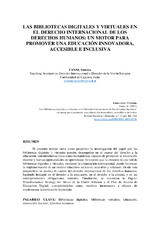Mostrar el registro sencillo del ítem
Las bibliotecas digitales y virtuales en el Derecho Internacional de los derechos humanos: un motor para promover una educación innovadora, accesible e inclusiva
| dc.contributor.author | Fanni, Simona | |
| dc.date.accessioned | 2022-09-15T17:09:01Z | |
| dc.date.available | 2022-09-15T17:09:01Z | |
| dc.date.issued | 2021 | |
| dc.identifier.issn | 2172-5004 | |
| dc.identifier.uri | http://hdl.handle.net/10396/23901 | |
| dc.description.abstract | El presente trabajo tiene como propósito la investigación del papel que las bibliotecas digitales y virtuales pueden desempeñar en el marco del derecho a la educación, considerándose éstas como herramientas capaces de promover la innovación docente y nuevas oportunidades de aprendizaje. Se expone que la creación de una red de bibliotecas digitales y virtuales, mediante la cooperación internacional, puede favorecer la implementación de un modelo educativo inclusivo, accesible y solidario. Desde esta perspectiva, se analiza el cuadro del derecho internacional de los derechos humanos, haciendo hincapié en el derecho a la educación, en el derecho a la ciencia, y en las correspondientes obligaciones estatales. Finalmente, se examinan la Digital Transformation Strategy for Africa de la Unión Africana y el Plan de Acción de Educación Digital, considerándolos como modelos interesantes a efectos de implementar la teorización formulada. | es_ES |
| dc.description.abstract | The present study explores the role that digital and virtual libraries may play in the framework of the right to education, as they are capable of promoting educational innovation and the definition of new learning opportunities. In particular, this study argues that the creation of a network of digital and virtual libraries through international cooperation may help the implementation of an inclusive and accessible educational model, based on solidarity. From this perspective, the landscape of international human rights law is analysed, especially the right to education and the right to enjoy the benefits of scientific progress, as well as the corresponding States’ obligations. Finally, two significant regional projects are assessed, namely, African Union’s Digital Transformation Strategy for Africa and the Digital Education Plan of the European Union, since they represent two viable models for the implementation of the view that this study theorizes. | es_ES |
| dc.format.mimetype | application/pdf | es_ES |
| dc.language.iso | spa | es_ES |
| dc.publisher | UCOPress | es_ES |
| dc.rights | https://creativecommons.org/licenses/by/3.0/es/deed.en | es_ES |
| dc.source | Docencia y Derecho 17, 162-182 (2021) | es_ES |
| dc.subject | Bibliotecas digitales | es_ES |
| dc.subject | Bibliotecas virtuales | es_ES |
| dc.subject | Educación | es_ES |
| dc.subject | Innovación docente | es_ES |
| dc.subject | Derechos humanos | es_ES |
| dc.subject | Digital libraries | es_ES |
| dc.subject | Virtual libraries | es_ES |
| dc.subject | Education | es_ES |
| dc.subject | Educational innovation | es_ES |
| dc.subject | Human rights | es_ES |
| dc.title | Las bibliotecas digitales y virtuales en el Derecho Internacional de los derechos humanos: un motor para promover una educación innovadora, accesible e inclusiva | es_ES |
| dc.title.alternative | Digital and virtual libraries in International human rights Law: a powerful tool for the promotion of innovative, accesible and inclusive education | es_ES |
| dc.type | info:eu-repo/semantics/article | es_ES |
| dc.relation.publisherversion | http://www.uco.es/docencia_derecho/index.php/reduca | es_ES |
| dc.rights.accessRights | info:eu-repo/semantics/openAccess | es_ES |

